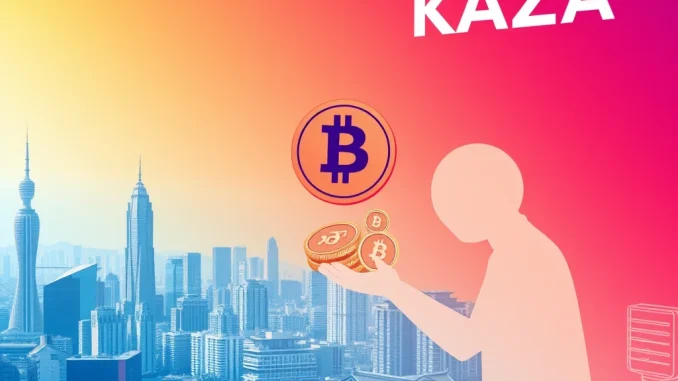
The digital asset market in South Korea has seen its share of controversies, and a recent one involving the WEMIX token has brought the role of the country’s major exchanges and their consultative body, DAXA, into focus. Amid questions surrounding listing and delisting decisions, the Digital Asset eXchange Alliance (DAXA) has stepped forward to clarify its position, particularly concerning the discretion held by individual member exchanges. This development is crucial for understanding the operational dynamics within the South Korea crypto landscape.
What Did DAXA Crypto Alliance Say?
DAXA, a collective body representing five of South Korea’s largest crypto trading platforms – Bithumb, Coinone, Korbit, Gopax, and Upbit – issued a statement on May 15. The core message from the DAXA crypto alliance was clear: it does not dictate which tokens its individual members list or delist. Instead, DAXA functions primarily as a consultative and cooperative body, focusing on shared standards and information sharing rather than centralized control over market access.
Key points from DAXA’s statement include:
- DAXA’s role is limited to consultation and cooperation among member exchanges.
- The alliance does not make collective decisions on token listings or delistings.
- Each member exchange retains sole discretion over these decisions.
The WEMIX Delisting Saga: Why It Matters
DAXA’s statement appears to be a direct response to the recent controversy surrounding the WEMIX delisting. This wasn’t the first time WEMIX faced removal from major Korean platforms; it was delisted by several DAXA members in late 2022 due to alleged issues with circulating supply reporting. Although it was later relisted on some platforms, Bithumb, Coinone, Korbit, and Gopax recently decided to delist it again. This repeated action, especially by multiple major exchanges, sparked debate among investors and the wider crypto community, raising questions about coordination among exchanges and the role of DAXA.
The controversy highlights:
- The significant impact of delisting on a token’s liquidity and investor confidence.
- Investor concerns about the transparency and fairness of listing/delisting processes.
- The perception (or misperception) of DAXA’s influence over its members’ operational decisions.
Understanding Crypto Exchange Listing Discretion
DAXA emphasized that granting individual exchanges sole discretion over crypto exchange listing and delisting decisions is vital for effective customer protection. This discretion allows exchanges to react swiftly to potential risks associated with specific tokens, such as:
- **Compliance Issues:** If a token project fails to meet regulatory requirements or an exchange’s internal compliance standards.
- **Project Health:** If there are concerns about the project’s viability, development progress, or team integrity.
- **Market Integrity:** If there are suspicions of market manipulation, wash trading, or other activities that could harm users.
- **Information Discrepancies:** As seen in the WEMIX case, if the project provides inaccurate or misleading information, particularly regarding supply or tokenomics.
This autonomy enables exchanges to maintain the integrity of their platforms and protect their users from potentially problematic assets. DAXA noted that multiple court rulings in South Korea have upheld this principle of exchange discretion, affirming their right to make such operational decisions unless exceptional legal circumstances dictate otherwise.
What This Means for Korean Crypto Exchanges and Investors
For Korean crypto exchanges, DAXA’s clarification reinforces their individual responsibility and authority. While they cooperate on industry-wide standards and best practices through DAXA, the ultimate decision-making power for which assets are available on their platform rests with them. This puts the onus squarely on each exchange to conduct thorough due diligence and ongoing monitoring of listed assets.
For investors in the South Korea crypto market, this clarification underscores the importance of understanding the policies of the specific exchange they use. It means:
- **Due Diligence is Key:** Investors should research not only the tokens they invest in but also the listing/delisting policies of their chosen exchange.
- **Risk Awareness:** Be aware that a token listed on one DAXA member exchange may not be listed (or could be delisted) by another.
- **Stay Informed:** Pay attention to announcements directly from the exchanges you use regarding potential issues with listed assets.
Looking Ahead: The Future of Token Listings in South Korea
The South Korea crypto market is maturing, with increasing calls for clear regulations. While DAXA’s statement clarifies the current operational structure, future regulatory frameworks may introduce more standardized processes or oversight mechanisms for crypto exchange listing decisions. However, for now, the discretion remains with the individual Korean crypto exchanges.
Conclusion
DAXA’s recent statement serves as an important reminder of the distinct roles within the South Korean crypto ecosystem. While the alliance facilitates cooperation, the critical decisions regarding which digital assets are available to traders rest with the individual exchanges. The context of the WEMIX delisting controversy brought this structure into sharp relief, highlighting the inherent discretion exchanges possess to protect their platforms and users. For participants in the South Korea crypto market, understanding this delineation of responsibility is vital for navigating the complexities of token availability and market dynamics.



